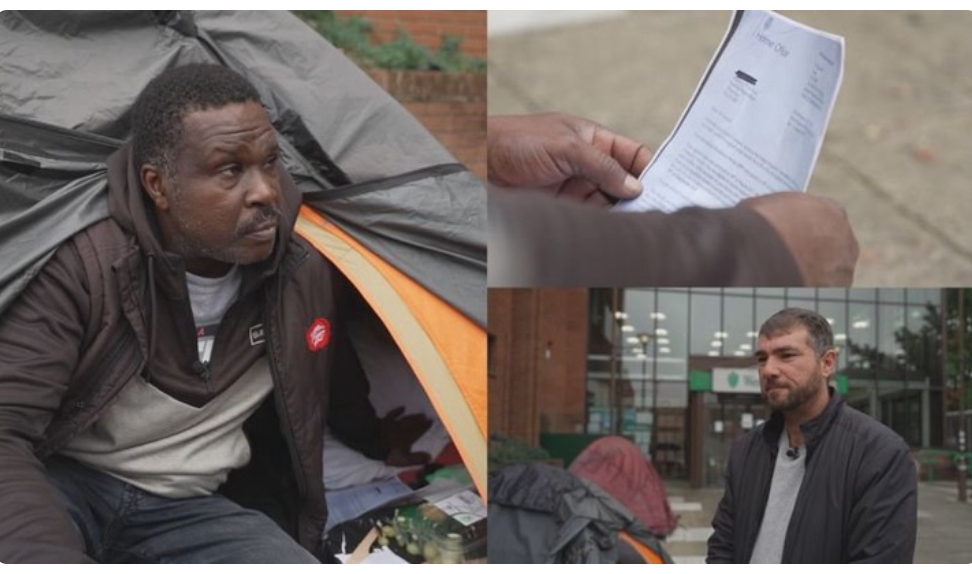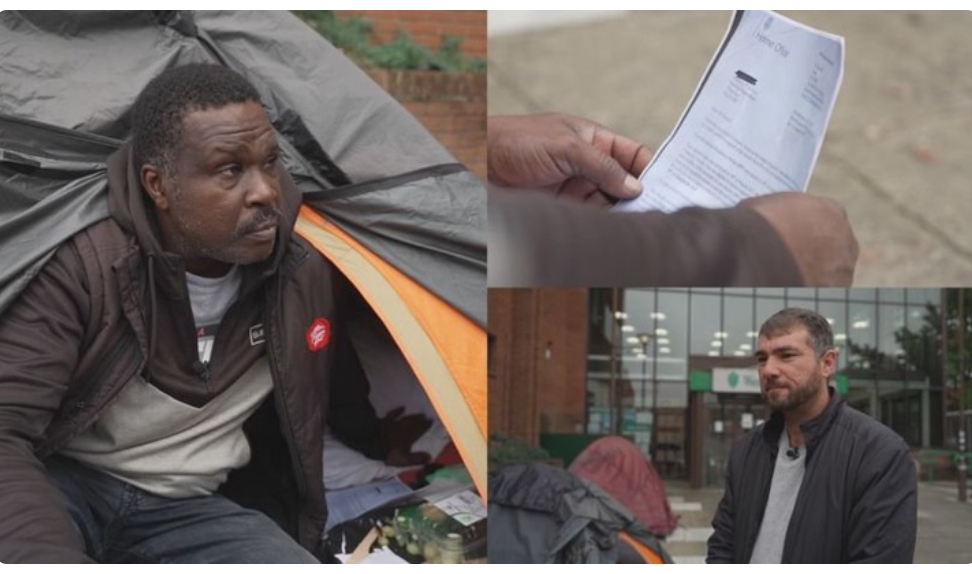
New refugees are facing homelessness and destitution under new Home Office practices which give them just seven days to leave their accommodation once they have been granted the Right to Remain.

Under previous government rules, refugees were given 28 days to leave Home Office accommodation once they’d received their Biometric Residence Permit – the documents which allow someone to get a job and find somewhere to live.
Now, refugees are often being given just seven days notice before being evicted – sometimes before they receive their documents.
With council homelessness services already on the brink, charities under huge pressure, and nowhere else to go, many have no choice but to sleep on the street.
ITV News spoke with two refugees: Abdulkareem, 36 from Syria, and Ali from Sudan, who are sleeping rough outside West Berkshire Council offices.
They have been there for nearly two weeks Both men were evicted from their Home Office accommodation in a nearby hotel once they got status, but say they have not been offered any accommodation by the Council.
Abdulkareem showed us the eviction notice he was served after getting refugee status.
He says he went to the job centre but they could offer him no help.
Abdulkareem fled Syria, and came to the UK a year and eight months ago.
Speaking to us via a translator, he said he thought the UK would bring him “freedom”.
“[In Syria], it was like we were in a prison…and it was made to sound like this was the freedom. But it is not freedom,” he said.
“I left a warzone to come [to the UK] to find a life. But I’m not living and I’m not dead in the war zone. At least I could have died and finished with it.”
Abdulkareem tells Sejal Karia ‘here I’m in limbo, I’m not living and I’m not dead’
Abdulkareem has a wife and two young children, aged six and seven, still in Syria who he hopes will also get status in the UK.
He says he can’t bring himself to tell them about his situation.
“I think the Home Office probably think that they gave me a magic wand by giving me this letter,” he said.
“But seven days to sort my life out, it was just very difficult. There was absolutely no way I could have sorted myself out within seven days.
“I really want to get on with my life, find a place to live, find a job to get on with my life. I feel ashamed of myself. I feel really useless.”
Ali fled Darfur, Sudan in 2016.
He was living in a Home Office hotel, before he was served an eviction notice on September 18.
He says all he wants is the opportunity to make a life here, working as an electrician.
“All I want is just accommodation and to be able to work,” he said.
‘I want to be able to work to help my children back home, all I need is for them to be living in safety’
The men are currently being supported by Newbury Soup Kitchen, who are offering them warm meals, tents and sleeping bags.
Their founder, Meryl Prail, told us that the situation on the ground is “escalating.”
“I’m really worried about it, there are more rough sleepers out there from the hotels, and it’s growing,” she said.
“We’re only just starting to see the impact of it now but it’s been rumbling around for the last three weeks or so.”
Meryl says that neither the local authority or the charity sector were given any warning from the Home Office about the change in practice.
She said: “We had no idea this was going to happen.”
She says she worries about how her small charity will be able to cope throughout this winter without help from the Home Office.
“We already have a homelessness problem. I understand in the last quarter homelessness in this country has gone up by 26%.
“We’ve all been thrown into this very quickly and we are going to have to manage somehow, but we cannot do this alone.”
The situation is not limited to West Berkshire – ITV News spoke to local authorities and charities across the UK who are struggling to cope with demand
ITV News can exclusively reveal that the London Deputy Mayor for Housing Tom Copley has written to Immigration Minister Robert Jenrick, warning that refugees are being pushed into street homelessness as a result of the change.
The letter – from Deputy Mayor Tom Copley and Councillor Darren Rodwell – warns of 111 people sleeping rough in London in the first half of this year who previously had Home Office provision.
They add that it is likely that this figure doesn’t show the scale of the issue.
The letter goes on to stress that the ‘on-the-ground challenges’ faced by London Councils are ‘acute’, and urges the Home Office to extend the official ‘move on’ period from 28 days to 56 days.
It points to evidence that the recent changes mean that the 28 day period has actually been “shortened even further” – leaving no time for support to be put in place for “vulnerable people who will otherwise fall into destitution.”
The Deputy Major warned Immigration Minister Robert Jenrick that he must address this issue, or risk more refugees being forced into destitution after a positive decision.
This intervention comes after over 140 charities, including the Refugee Council, wrote to the Home Office warning of the huge pressures on the voluntary sector, and ’severe hardship’ for refugees.
“The significant number of refugees already made homeless by this change is also placing huge pressures on the voluntary sector, including refugee hosting and housing schemes, and mainstream homelessness services.
“The demands are quickly becoming unsustainable. It is already inevitably leading to increased rough sleeping, undermining government targets to end it.”
The letter also said organisations “are finding that local authorities have not been told of the new arrangements, meaning that they are not ready to respond quickly.”
A Home Office spokesperson told ITV News: “The pressure on the asylum system has continued to grow, with hotel accommodation costing millions of pounds a day.
“We encourage individuals to make their onward plans as soon as possible after receiving their decision, whether that is leaving the UK following a refusal, or taking steps to integrate in the UK following a grant.
“We are also modernising the asylum system, increasing productivity by simplifying and digitising processes, and recruiting record numbers of asylum decision-makers, with 40% more in post compared to the start of December 2022.”
Tom Copley, the Deputy Mayor for Housing and Residential Development, said: “It is extremely concerning that hundreds of people seeking asylum in London are at risk of becoming homeless or sleeping rough on our streets as a result of the Government’s hostile approach to refugees.
“Whilst councils, charities and the Mayor are doing all they can to end rough sleeping in the capital, recent changes made by the Government have significantly increased the risk that people recognised as refugees will be left homeless.
“In the first six months of 2023 alone, 111 people left Home Office accommodation and ended up on London’s streets.
“The sad reality is that hundreds more may have slipped through the net, and the current policy means the problem is likely to get even worse.
“Ministers must give local authorities the resources they need to carry out vital homelessness prevention work and extend the move-on notice period from 28 days to 56 days.
“It is also crucial that newly recognised refugees are given the documentation they need to access work and support as well as ensuring that statutory bodies have the live information they need to prevent more people in the capital from becoming homeless.”




